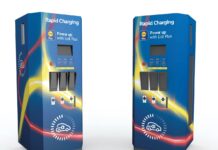The trial of Sainsbury’s checkout-less technology, which enables customers to pay for goods on their mobile phone in the retailer’s Euston store, shows the prominent role that mobile technology will play in the reduction of friction in the retail environment. This is according to Qmatic UK Ltd, which leads the market in customer journey management technology solutions.
Customers can use the Sainsbury’s app to scan items with their mobile phone, payment is then taken automatically and they can leave the store without going through a checkout. The use of a mobile app to remove potential friction points in the customer journey, such as the checkout, appears to reflect a growing consumer trend of mobile technology integrated into the shopping experience.
Vanessa Walmsley, Managing Director at Qmatic UK, suggests that as more retailers adopt innovative mobile technology, there is even more value to be unlocked when it comes to managing the customer journey.
Vanessa explained: “We are seeing more and more retailers focus on improving the customer experience and integrating advanced technology into their store to offer a more seamless, omnichannel customer journey. Sainsbury’s extension of its trial, reportedly to an additional 50 stores later in the year, is just one example of a major retailer trying to reduce friction in their stores to increase customer loyalty. Research which we conducted with 100 UK retailers earlier this year revealed that 49% of respondents identified mobile optimised checkouts as the innovation most likely to impact the customer experience, further demonstrating the potential impact of this technology in reducing friction in the customer journey.
“Most retailers have already optimised their websites for mobile use, but they must now do the same for the in-store environment. Mobile technology is the connecting force that stands to join the online and physical worlds; this technology helps to match and exceed the seamlessness of online shopping, ultimately creating an omnichannel experience. The integration of mobile technology to the in-store environment can win over new customers, deepen relationships with existing customers, and raise the productivity and satisfaction levels of staff member,” Vanessa said.

She added: “However, there is also huge value to be unlocked when it comes to leveraging mobile to route customer journeys during checkout, for example, to get a security tag removed or for age verification on restricted products. It is in these instances that mobile cannot be used alone, in fact there is always going to be a role for manned and self-service tills and kiosks. The right strategy will exploit these developments and use them to create faster, smoother checkout experiences.
“The integration of mobile technology can also let customers and employees move around the retail environment seamlessly, improving service interaction and enabling team members to relate personally and directly with customers on their terms from anywhere in the environment. For example, retailers can offer a personalised experience – via a mobile app on a tablet for example – understanding and processing the customers’ needs as they walk in the door or as they are engaged in the interaction itself,”
She concluded: “While investing in this kind of innovative technology and providing ways to reduce friction along the in-store journey, you will facilitate the consumer who is increasingly accustomed to using their mobiles to interact with the retailer in-store. But looking beyond payment and creating a broader strategy that looks at the customer journey for everyone means you will be less likely to alienate those who prefer traditional checkout or simply want the skills of a human.”




















